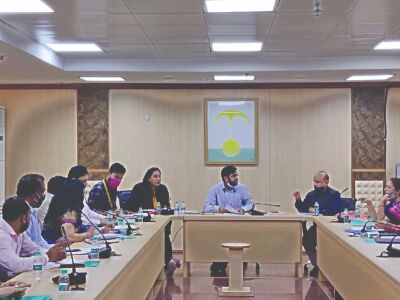'Scars that no child rights body can heal'

New Delhi: "Incidents such as violence, riots leave behind a trail of unexpressed emotions which if not handled properly can lead to serious long-term effects and may make children emotionally more vulnerable, prone to post-traumatic disorder, socially awkward; thus, leaving behind scars that no child rights body can heal," read a report of Delhi Commission for Protection of Child Rights (DCPCR) related to work done by them aftermath of the north-east Delhi Riots last year.
In their 17-page report, the child rights body talked about the vulnerable situation of children during riots. After-effects of these riots left scars in the minds of people especially children who found their life coming to a standstill in the aftermath of these riots. There was panic all around and people were forced to vacate their homes and move to temporary shelter homes.
A 8-year-old boy with cognitive disabilities, having witnessed the destruction first hand, was indulging in violent outbursts, hurting himself and sometimes even other children around him. After a series of counselling sessions and interventions, the child began to become cognizant about his suppressed anger, and then in about three weeks of therapy, he went from distraught to happy and affectionate and seemed more in control of his thoughts and actions.
A 16-year-old girl, studying in Class IX was shot in the hand during the riots. She was severely injured and thus could not appear for her year-end examination. The commission took suo-motu cognisance of her situation and the school was directed to treat her case based on empathy and another opportunity be provided to the child to appear for the exams that she missed due to riots. Different mediums of therapy were used to help the children.
"Through this report, we wish to highlight the importance of interventions in crisis situations. The commission is hopeful that this report would be found useful by different stakeholders in drawing a roadmap in strengthening post-violence interventions in NCT of Delhi," said Anurag Kundu, chairperson, DCPCR.
Ranjana Prasad, member, DCPCR, said, "We hope that this report is a beginning in not only deepening the understanding effects of conflict on children, but also in strengthening the interventions in times of need." According to child rights body, appreciation, praise and general goodwill that was on display in the relief camp, small children singing and dancing in joy, was a gentle reminder that for the sake of children, we all can once again be guided by the principles of fraternity.
"An inspection was undertaken by a team from the commission to assess the damage occurred and prepared an intervention plan which was focused on three aspects, immediate relief, restoration plan and tracking victim compensation," DCPCR said in the report.
As per child rights body, they rigorously tracked disbursement of victim compensation as announced by the Government of NCT of Delhi. This step is crucial as the past track record of such incidents have shown that the compensation which is announced by the governments either does not reach the intended beneficiary or reaches so late that the actual intent behind the compensation is lost.



